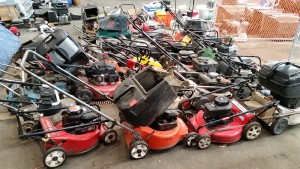CRN success in large-scale reuse approach
 Ākina Foundation
Ākina Foundation
One person’s junk is another person’s treasure has been put into practice with a new approach to inorganic collection in Auckland.
The Community Recycling Network (CRN) is contracted by Auckland Council to distribute goods collected in the citywide inorganic collection by Waste Management. CRN works with organisations that can use the second hand goods, resulting in less waste going landfill, creating jobs and generating revenue for community benefit.
CRN Project Manager Sei Brown said they were already hitting five full truckloads per day at peak and the project was operating at less than half of the seven Auckland collection areas.
Mr Brown said part of the success was due to Aucklanders putting out good quality reusable items for collection in the knowledge that CRN would help find new homes for their unwanted items.
“We have been able to find new homes for things like antiques and bicycles, whiteware and power tools, beds and furniture. Bric-a-brac has been very popular among our charity shops,” he said.
One of the highlights had been the formation of a new social enterprise to provide a solution for items that would have ended up in the landfill, Mr Brown said.
“We had a sea of fridges, washing machines and dryers covering the warehouse floor in the first six weeks.”
As a result, Envision NZ Director Matthew Luxon set up a social enterprise on site, Resource Rescue. He has employed two people to test and repair and clean the appliances before on-selling them.
“As well as giving used appliances new life, Resource Rescue provides a great training pathway for employment,” Mr Luxon said. “A worker might start by cleaning machines, then learn some basic repair skills, become trained for tag and test, pick up more specialist skills and gain qualifications and registration as an electrical serviceperson.”
CRN Executive Officer Dorte Wray said the primary purpose was reuse – not recycling – as it was better to reuse items that still had useful life left in them. However, one of the biggest challenges they had discovered was how to deal with end-of-life products like redundant electronic materials.
“In the first nine weeks, we collected more than 100 cubic metres of TVs, computers, printers and other electronic material. This meant recycling was the only option,” she said.
Mr Brown said another success factor was that community groups and organisations participating in the inorganic collections were seeing direct value in the materials collected for them.
“Some groups come at least once a week while other groups like Habitat for Humanity and the African Welfare Trust are coming to us nearly every day and taking away goods going straight into homes.”
He said some items went to organisations’ second hand shops to help generate revenue for their charities and support their work, while groups like St Vincent de Paul took some beds and fridges directly into family homes.
Ms Wray said they were looking forward to the collection expanding in February so that an even greater volume of waste would be diverted from landfill. She welcomed community organisations to get in touch if they’d like to get involved.
Ākina CEO Alex Hannant said this operation was an example of how smart procurement can achieve social and environmental outcomes alongside a range of economic benefits.
“This new inorganic collection is achieving multiple outcomes because it’s been designed and managed well. We have new jobs, we have purposeful employment for people with disabilities, we have useful objects being saved from landfill, and we have householders being able to get rid of their unwanted possessions easily,” he said.
Ms Wray said in the first nine weeks the team had been collecting from parts of Rodney, North Shore and Waitakere City and they would be expanding to the rest of Auckland in February. Interested people who wanted to know what would be picked up and when, should contact Auckland Council on 09 301 0101 or check the CRN website on www.communityrecyclers.org.nz.
loading...
loading...



Voices of our community